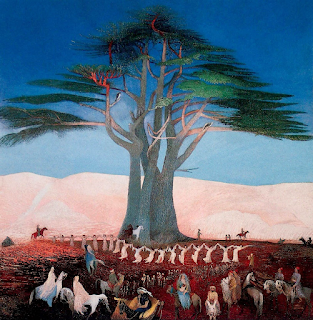The term “veil” we normally think of as concealing something was used by Wesley to express that what had been concealed was now revealed. Paul wrote to the Colossians about Jesus that, “in him dwelleth all the fulness of the Godhead bodily” (Colossians 2:9 KJV). To the Ephesians, Paul wrote concerning the mystery of Christ which previously had been hidden but now has been revealed in such a way that all of humanity may become “partakers of his promise in Christ by the gospel” (Ephesians 3:6 KJV). Jesus revealed in his humanity the true nature of God. Through the teaching of Jesus, we learn the precepts of the ultimate truth and commandment of love. Through the example of Jesus, we discover how all of his teachings may be implemented in our own lives of spirit and flesh.
Manuscript of the sermon preached on December 25, 2022, for Briensburg UMC [Audio Podcast]
Christmas Bible Readings: Isaiah 9:2-7; Psalm 98; Titus 2:11-14; Luke 2:1-14All Creation celebrates the peace and good will of God.
Glory to God in the highest, and on earth peace, good will toward men. (Luke 2:14 KJV)
Angels sang along with
“a multitude of the heavenly host.” In addition to the angels, the heavenly
host consists of everyone who has been born on earth and then taken to heaven. Our
ancestors have been and our families and friends along with the whole family of
God continues to be added to that number as the chorus continues. During the
Great Thanksgiving in our Communion Liturgy we affirm, “with your people on
earth and all the company of heaven we praise your name and join their unending
hymn” (Service of Word and Table). Wesley wrote in another hymn,
Let saints on earth in concert sing
with those whose work is done;
for all the servants of our King
in heaven and earth are one.
One family, we dwell in him,
one church, above, beneath;
though now divided by the stream,
the narrow stream of death.
Remembering that it
was not just the angels, but the multitude of others in heaven who sang the praises,
helps us realize that we are included in these never ending eternal hymns of
praise. The heavenly choir sang their anthem to the shepherds and through them communicated
the Incarnation to us, and through us to the world.
Make happy sounds
Make a joyful noise unto the Lord, all the earth. (Psalm 98:4a)
We are invited to
join with the angels in making our “joyful noise.” “All creatures of our God
and King, Lift up your voice and with us sing!” wrote St. Francis of Assisi. Our
joyful noise begins with joy, which then flows into and through all our
expressions. Sometimes when we listen to the sounds of nature we might imagine
the whole of creation making music in unison and harmony.
In our private worship at home and our public worship at church, our singing and testimonies and reading and liturgy and prayers all work together to make these joyful noises in concert with the heavenly themes to unite us in universal, all-inclusive anthems of celebration. Likewise, in our conversations with each other, our words express the movement of the Spirit within us as we enjoy and share the blessings of God’s eternal love and presence.
The light is traveling through the darkness
The people that walked in darkness have seen a great light: they that dwell in the land of the shadow of death, upon them hath the light shined. (Isaiah 9:2 KJV)
Jesus told Nicodemus that the only condemnation is in choosing the darkness over the light. The Message version phrases this teaching of Jesus in John chapter 3:
This is the crisis we’re in: God-light streamed into the world, but men and
women everywhere ran for the darkness. They went for the darkness because they
were not really interested in pleasing God. Everyone who makes a practice of
doing evil, addicted to denial and illusion, hates God-light and won’t come
near it, fearing a painful exposure. But anyone working and living in truth and
reality welcomes God-light so the work can be seen for the God-work it is.” (John
3:19-21 MSG)
John the Baptist preached that “in [Christ] was life; and the life was the light of [humanity].” (John 1:4 KJV). Jesus taught in the Sermon on the Mount, “Ye are the light of the world” (Matthew 514 KJV). The light of Christ shines through us into the lives of those who remain in darkness, helping them to find in God’s Word their, “lamp unto their feet, and their light unto their path.” (Psalm 119:105 KJV)
The love we celebrate at Christmas brings healing to everyone.
Paul wrote to Titus: The grace of God that bringeth salvation hath appeared to all people (Titus 2:11 KJV)
Eventually everyone will experience the healing salvation of God’s grace. There are no prerequisites; salvation is God’s gift to humanity as a whole and to each person individually. God’s grace is offered in its entirety, and we are free to receive it as limited or as fully as we want it. Each person has the authority and blessing of being able to share with others whatever we have discovered and experienced already, and to continue to be a conduit of God’s grace and love even as we are receiving it.
Christmas is our celebration of Christ revealing the character and personality of God. What had been concealed has now been revealed. The greatest revelation of all is that God loves us, each and every one of us, and wants us all to share eternal life of love and peace and joy “with all God’s people on earth, and all the company of heaven.”
“Glory to God in the highest, and peace to God’s people on earth!” (The Gloria)
In the Name of Jesus, Amen.






